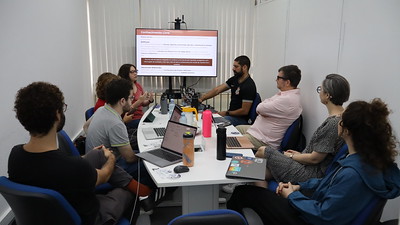

Researchers from the Center for Metropolitan Studies held a workshop to perfect Wikipedia edits (photo: Janaína Simões/Communicação CEM)
Researchers will edit and create Portuguese-language Wikipedia entries related to the center’s areas of knowledge.
Researchers will edit and create Portuguese-language Wikipedia entries related to the center’s areas of knowledge.

Researchers from the Center for Metropolitan Studies held a workshop to perfect Wikipedia edits (photo: Janaína Simões/Communicação CEM)
Agência FAPESP* – The Center for Metropolitan Studies (CEM) is developing a cooperative project with the Wikimedia Brazil Movement, an independent organization that supports Wikimedia Foundation projects in Brazil. The Foundation is responsible for Wikipedia, Wiki Commons, Wikibooks, Wikidata, Wikiversity, and others worldwide.
The CEM is a FAPESP Research, Innovation, and Dissemination Center (RIDC) based at the University of São Paulo (USP) and the Brazilian Center for Analysis and Planning (CEBRAP).
At the beginning of this partnership, a team of CEM researchers is set to work on creating and editing entries related to the center’s areas of knowledge within the Portuguese-language Wikipedia. In March, the CEM hosted the first workshop on the Wikipedia editing platform.
During the meeting with representatives from Wikimedia Brazil, the researchers learned the principles of Wikipedia and how to use the text editing platform to create or modify entries. Alexander Hilsenbeck, the Education and Scientific Dissemination Manager at Wikimedia Brazil, and Thais May Carvalho, the organization’s Project Assistant, gave a general presentation on Wikipedia. They explained how to use the system to edit and insert information, after which the participants did practical exercises to understand the platform.
The CEM’s partnership with Wikimedia Brazil is inspired by the initiative of the Research, Innovation, and Dissemination Center for Neuromathematics (NeuroMat), which is another RIDC supported by FAPESP at USP. The institution has become a world reference in offering structured information in the Wiki universe in the field of mathematics, having created more than 4,000 entries and contributed to another 21,000.
“In the field of social sciences, there are no initiatives of this kind in Portuguese. The CEM would act as a reference institution,” explains Adrian Gurza Lavalle, deputy director of the RIDC. “With this partnership, we’re seeking not only to increase the CEM’s visibility, but also to contribute to the dissemination of science-based information to the general public, which can be widely reached due to Wikipedia’s popularity,” he adds.
According to Edney Dias, a CEM researcher and one of the initiative’s coordinators, one of the initial activities of the CEM team on Wikipedia will be improving entries. “In our analysis of the current content, carried out in conjunction with Wikimedia Brazil, we identified entries that require greater conceptual rigor, more referencing, or even expansion and unfolding,” he says.
The team will also work on creating new content. “The number of social science entries in Portuguese is relatively small, with fewer than 600 depending on the classification criteria. Within the CEM’s expertise, there are several entries in specific areas that can be developed, such as public policies and inequality,” the coordinator explains.
Initially, the researchers worked on filtering and critically analyzing the existing entries, as well as consolidating a new repertoire. To accomplish this, they consulted the CEM coordinators. In the first few months of the project, they planned to make interventions on approximately 150 entries, which would be monitored by Wikipedia metrics on the initiative’s specific page.
“The CEM faces the challenge of bringing social scientific content to a wide audience in a language with less academic jargon, accessible and palatable. This volume of information will be accessed free of charge and critically appraised in the context of an open encyclopedia. In times of disinformation, this is a dialogue that’s as innovative as it is necessary,” says Dias.
* With information from Janaína Simões from CEM
Republish
The Agency FAPESP licenses news via Creative Commons (CC-BY-NC-ND) so that they can be republished free of charge and in a simple way by other digital or printed vehicles. Agência FAPESP must be credited as the source of the content being republished and the name of the reporter (if any) must be attributed. Using the HMTL button below allows compliance with these rules, detailed in Digital Republishing Policy FAPESP.





